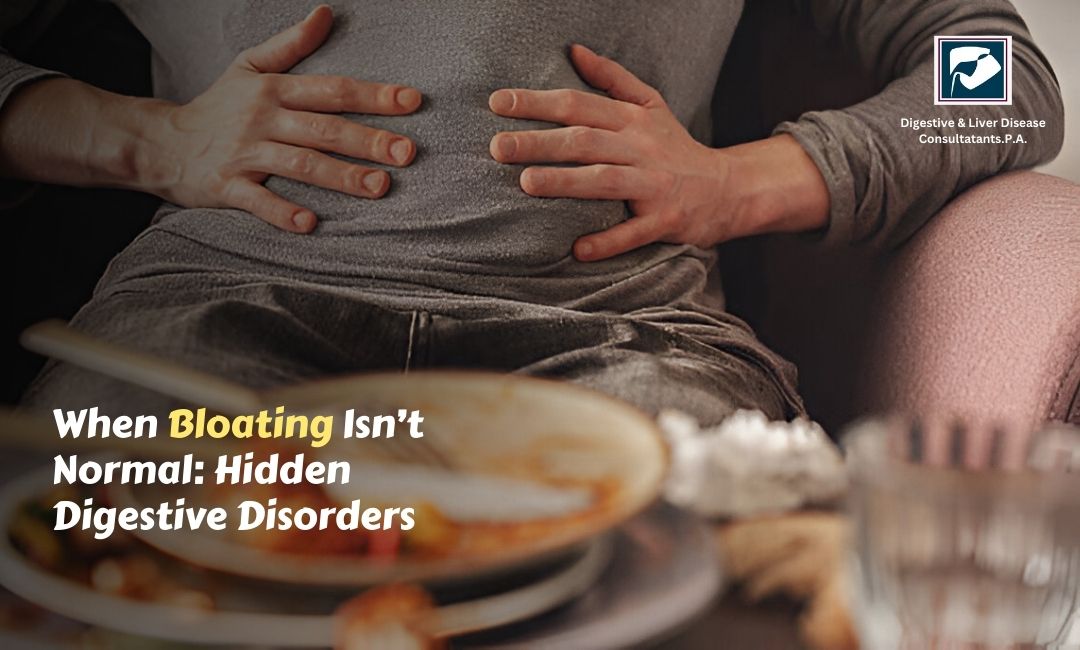Most people experience bloating occasionally, especially after eating a heavy meal, salty food, or carbonated drinks. While this is usually harmless, bloating that happens often, lasts long, or is paired with pain and other symptoms may signal an underlying digestive disorder. Knowing when bloating is a red flag can help you protect your digestive health and get timely treatment.
At Digestive & Liver Disease Consultants, P.A. (DLDC), our team of board-certified gastroenterologists helps patients across Texas find answers to persistent digestive problems. In this article, we’ll explore when bloating is not normal, the hidden digestive disorders that may cause it, and how you can find relief.
What is Bloating?
Bloating is the feeling of fullness, tightness, or swelling in your stomach. It may make your abdomen look visibly larger, and some people also feel discomfort or pain. Occasional bloating is common, but frequent or severe bloating may be your body’s way of telling you something more serious is going on.
When Bloating Isn’t Normal
Bloating can be considered abnormal when it:
- Happens often, not just after overeating
- Lasts for several days or keeps coming back
- Causes sharp or severe abdominal pain
- Comes with nausea, vomiting, or diarrhea
- Leads to unexplained weight loss
- Is paired with blood in stool or black stools
If you notice these symptoms, it is important to consult a gastroenterologist. Persistent bloating could be linked to hidden digestive disorders that need medical care.
Hidden Digestive Disorders That Cause Bloating
1. Irritable Bowel Syndrome (IBS)
IBS is one of the most common causes of chronic bloating. It affects how your intestines move food through the digestive tract, leading to symptoms like:
- Gas and bloating
- Abdominal pain or cramps
- Diarrhea, constipation, or alternating between the two
While IBS is not life-threatening, it can disrupt daily life. Managing IBS often involves dietary changes, stress management, and medications prescribed by your gastroenterologist.
2. Small Intestinal Bacterial Overgrowth (SIBO)
Your intestines naturally contain bacteria, but when too much bacteria builds up in the small intestine, it can cause SIBO. Common symptoms include:
- Severe bloating
- Excessive gas
- Diarrhea or constipation
- Malnutrition or unexplained weight loss
SIBO often occurs after surgery, certain medications, or underlying conditions like diabetes or Crohn’s disease. Treatment typically includes antibiotics and a tailored diet plan.
3. Celiac Disease
Celiac disease is an autoimmune disorder where the body reacts negatively to gluten, a protein found in wheat, rye, and barley. In people with celiac disease, gluten damages the small intestine lining, causing bloating, diarrhea, and nutrient deficiencies. Early diagnosis and adopting a gluten-free diet are key to preventing long-term complications.
4. Lactose Intolerance
Lactose intolerance happens when the body cannot digest lactose, the sugar found in milk and dairy products. Symptoms usually appear within hours of consuming dairy and may include:
- Bloating
- Stomach cramps
- Gas
- Diarrhea
Reducing or avoiding dairy often helps, but a gastroenterologist can confirm the diagnosis and guide you with safe dietary alternatives.
5. Gastroparesis
Gastroparesis is a condition where the stomach takes too long to empty food into the small intestine. This can lead to bloating, nausea, vomiting, and early satiety (feeling full quickly). Diabetes is a common cause of gastroparesis, but it can also result from nerve damage or certain medications.
6. Inflammatory Bowel Disease (IBD)
IBD includes Crohn’s disease and ulcerative colitis, which are chronic conditions that cause inflammation of the digestive tract. Along with bloating, patients may experience:
- Severe abdominal pain
- Bloody stools
- Persistent diarrhea
- Fatigue and weight loss
IBD requires long-term care with a gastroenterology specialist to prevent complications.
7. Ovarian or Colon Cancer
While rare, persistent bloating can sometimes be a sign of cancer, particularly ovarian or colon cancer. Warning signs may include:
- Ongoing abdominal swelling
- Unexplained weight loss
- Fatigue
- Changes in bowel habits
Early detection is critical. If bloating is severe and ongoing, it’s important to seek medical care immediately.
How to Manage and Prevent Bloating
Even when bloating is not linked to a serious disorder, certain lifestyle changes can help reduce symptoms:
- Eat slowly and chew thoroughly to avoid swallowing excess air.
- Limit carbonated drinks and foods that produce gas, such as beans and onions.
- Stay active with regular exercise to help digestion.
- Keep a food diary to identify foods that trigger bloating.
- Stay hydrated to support healthy digestion.
- Seek professional help if bloating is frequent or severe.
Why Choose Digestive & Liver Disease Consultants, P.A.?
At Digestive & Liver Disease Consultants, P.A., we specialize in diagnosing and treating digestive and liver conditions, including chronic bloating and hidden gastrointestinal disorders. Our team of highly trained gastroenterologists uses advanced diagnostic tools such as endoscopy, colonoscopy, and imaging tests to find the root cause of your symptoms.
We take a patient-centered approach, combining medical expertise with personalized treatment plans. Whether you are dealing with IBS, SIBO, celiac disease, or other digestive health concerns, our goal is to help you feel better and improve your quality of life.
Our clinic is trusted by patients across Texas for:
- Board-certified gastroenterologists with decades of experience
- Comprehensive digestive and liver care under one roof
- Advanced endoscopic and diagnostic services
- Personalized treatment plans designed around your needs
Conclusion
Occasional bloating may not be a concern, but frequent or severe bloating can be a sign of hidden digestive disorders such as IBS, SIBO, celiac disease, or IBD. Paying attention to your symptoms and seeking timely care can make all the difference in protecting your digestive health.
At Digestive & Liver Disease Consultants, P.A., we are here to help you uncover the cause of your bloating and guide you toward lasting relief.
If you suffer from persistent bloating or other digestive issues, schedule an appointment with one of our experienced gastroenterologists today. Your health deserves expert care.






